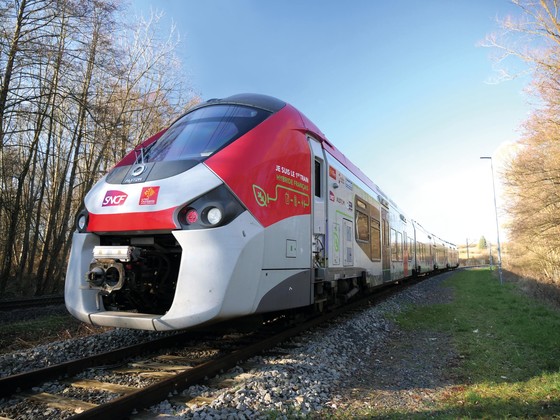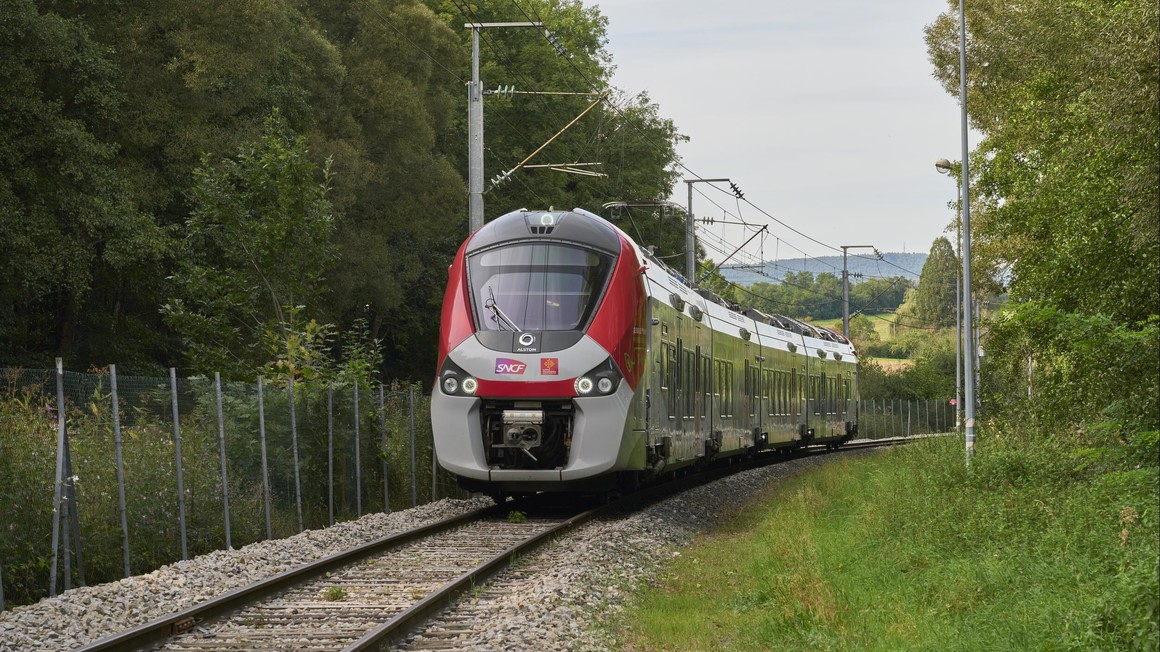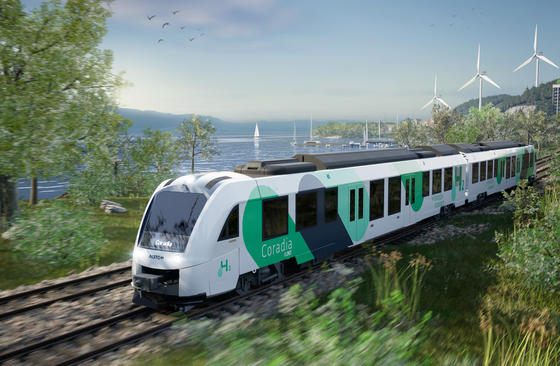
SNCF Voyageurs and Alstom present the first French hybrid train for the Occitanie, Grand-Est, Nouvelle-Aquitaine and Centre-Val-de-Loire regions
SNCF Voyageurs and Alstom present the first French hybrid train for the Occitanie, Grand-Est, Nouvelle-Aquitaine and Centre-Val-de-Loire regions
-
The first few months of testing the hybrid Régiolis trainset have been conclusive. The recycling and reuse of braking energy will reduce the train's energy consumption by up to 20%.
-
The commercial service will start in the second quarter of 2023 with services in the territories of each of the four partner regions.
-
A zero-emission mode will be tested on urban routes.
One year after its hybridization and after 8 months of tests, SNCF Voyageurs and Alstom are presenting the first French hybrid train at the Alstom site in Reichshoffen and in the Régions de France headquarters in Paris, with the participation of the Occitanie, Grand-Est, Nouvelle-Aquitaine and Centre-Val-de-Loire regions.
A French première
This electric-diesel-battery regional train is the first hybridisation project of a Régiolis train in France. The project was launched in 2018 by SNCF Group and Alstom, with the mobilisation and financial participation of the Occitanie, Grand-Est, Nouvelle-Aquitaine and Centre-Val-de-Loire Regions, and the provision by the Occitanie Region of a train from its liO fleet. The ambition of the project is to contribute to the decarbonisation of the regional trains fleet. The objectives are to reduce energy consumption and greenhouse gas emissions, with a solution that makes it possible to adapt the existing diesel fleet without having to modify the current infrastructure.
Eight months of testing
The validation of the energy storage systems at Alstom's Tarbes site (centre of excellence for "green" traction systems), at the end of 2020, enabled the first Régiolis train to be hybridised at the beginning of 2021 at the Alstom Reichshoffen site. The hybridisation of the train consisted of replacing half of the diesel engines with energy storage systems made up of lithium-ion batteries. The train was also temporarily equipped with a laboratory coach and sensors to measure the train's energy flows.
Equipped with its two energy storage systems and its laboratory coach, the train started its tests in 2021. A static and dynamic tuning phase at up to 60 km/h took place in Reichshoffen to check the train's operations and test its hybrid traction mode. The tests then continued on the Velim test center (in the Czech Republic), with validation and certification tests at up to 160 km/h. All of the train's new traction modes were tested at high speed and the route simulation models were validated.
Successful initial feedback
The tests showed that the train performed as expected.
The rate of energy recycling during braking, which is used to recharge the batteries, is very high, over 90%, allowing energy savings of up to 20%, depending on the itinerary.
With a range of around 20 kilometres, the zero-emission mode allows the train to run without using combustion engines: this feature will be tested in commercial service to reduce pollution in certain urban areas. The hybrid Regional Train will have the same autonomy on non-electrified lines as the dual-mode diesel-electric version, up to 1,000 kilometres.
Next steps
The first hybrid regional train will soon leave the Reichshoffen site to begin its final test phase on the French national railway network. These final tests will enable SNCF Voyageurs to finalise the admission file that will be presented to the Public Railway Safety Establishment (EPSF) with a view to obtaining the necessary authorisations for its commercial operation. This period will also be used by SNCF Voyageurs to prepare the operation of the train in the various territories (traffic plan, staff training, etc.). The experimental commercial service will start in the second quarter of 2023 with traffic in each of the partner regions, before considering the deployment of the hybrid solution on the existing Régiolis fleet.
“The trials of the first Régiolis hybrid train demonstrate that hybridisation of diesel trains is a realistic solution, both technically and economically, to reduce energy consumption and greenhouse gas emissions. Alstom is particularly proud to contribute with SNCF and the Occitanie, Grand-Est, Nouvelle-Aquitaine and Centre-Val-de-Loire regions to a cleaner and more sustainable mobility”
“The trials of the first Régiolis hybrid train demonstrate that hybridisation of diesel trains is a realistic solution, both technically and economically, to reduce energy consumption and greenhouse gas emissions. Alstom is particularly proud to contribute with SNCF and the Occitanie, Grand-Est, Nouvelle-Aquitaine and Centre-Val-de-Loire regions to a cleaner and more sustainable mobility” says Jean-Baptiste Eyméoud, President, Alstom France.
“In the battle we are waging on behalf of the Regions to decarbonise TERs, we have chosen to invest in hybrid trains, which are a useful solution for reducing CO2 emissions effectively and quickly. Alongside hydrogen and biofuel, hybrid trains have their rightful place in the mix of technologies we are banking on in our PLANETER program to move away from diesel” says Christophe Fanichet, CEO of SNCF Voyageurs.
“We are very proud to participate today in the presentation of the first hybrid train to run on the French rail network. The skills of the SNCF and Alstom technical teams have made it possible to meet the challenge of integrating an innovative traction chain into existing equipment, thus paving the way for the decarbonisation of regional trains. To offer the Regions other alternatives to diesel by 2024-2025, we are also working on other solutions, such as hydrogen and battery-powered trains, as well as the partial electrification of lines,” says Carole Desnost, SNCF Group Director of Technology, Innovation and Projects.
“The climate emergency we are facing means that we have to rethink our modes of transport, the main source of greenhouse gas emissions in France. It's not a question of travelling less, but of travelling better! This is the whole point of our Green Pact for Occitanie, because I believe that mobility is a right. Rail is also a response to the strong demographic growth of our region, a tool for regional development.
I therefore wished to launch an ambitious plan for the development of public transport. This involves providing an adapted, quality and accessible service, with attractive prices. And the results are there, since ridership has increased on liO trains. Proof that our citizens are ready to take the leap when there is an offer.
Making Occitanie a pioneer and an exemplary region in terms of innovation and low-carbon transport naturally involves the train. As early as 2018, I committed the Region, alongside our partners, to the experimentation of the hybrid train, which offers a sustainable progress in terms of energy savings and reduction of greenhouse gas emissions. Today, we are taking a major step forward before the commercial launch of this train in early 2023. Tomorrow, we will go even further as the first hydrogen train will run between Montréjeau and Luchon in 2025.
I am convinced that the train remains our best asset in the battle to reduce the carbon footprint of our travels”. Carole Delga, President of the Occitanie / Pyrénées-Méditerranée Region, President of Régions de France.
“This "green" technology is one of the solutions that can rapidly generate a significant reduction in greenhouse gas emissions from conventional diesel equipment in use, and is fully in line with the regional and national strategy in favour of low-carbon mobility. The Grand Est Region is proud to participate in this promising project, which will contribute to the greening of railway rolling stock and the development of a genuine sector in favour of the sustainable development of mobility, participating in the reindustrialisation and the revival of employment in the regions concerned”. Jean Rottner, President of the Grand Est Region.
“The greening of the TER fleet is one of the major ambitions decided in Néo Terra, the roadmap of the New Aquitaine Region intended to accelerate the environmental transition, and one of our objectives is the decarbonisation of transport and therefore the withdrawal of diesel TERs by 2030. To achieve this, various technologies are envisaged in the Region: rechargeable batteries, hydrogen, biodiesel (B100), bioGNV and of course hybridisation, for which I am delighted with this presentation. Very soon a hybrid TER will be on the rails, which is excellent news for our travellers, for the industry and for the planet”. Alain Rousset, President of the Nouvelle-Aquitaine Region.
“The challenge of mobility throughout the Centre-Val de Loire region is our priority. It involves saving and renovating local lines, to which we have made a strong commitment with the State, but also the vital issue of renewing rolling stock. It is therefore with ambition that we have decided to commit to the hybridisation of our existing equipment. The fact that this program is moving into the production phase demonstrates its relevance and allows us to foresee, in the near future, cleaner trains that are closer to the territories and their inhabitants”. François Bonneau, President of the Centre Val de Loire Region.


